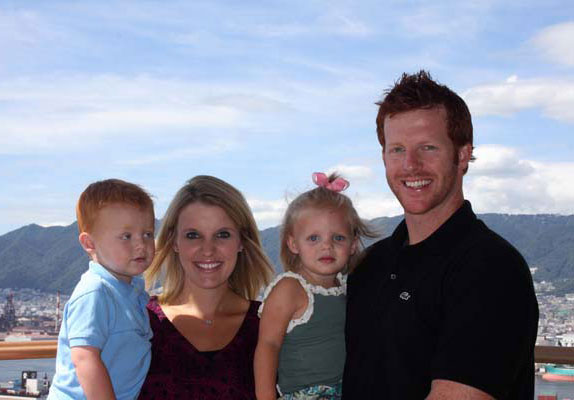As the battle between the St. Louis Cardinals and Texas Rangers heats up, former MLB outfielder Matt Murton is watching the World Series at home with his family. On Saturday night, the red-headed Florida native, his wife, Stefani, and two young children will cuddle on their comfortable leather sofa for Game 3. But the Murton clan is more likely to munch on edamame, sushi or udon noodles than pizza or hot dogs.
You see, “home” is Kobe, Japan, where—far from being sidelined—the 30-year-old is experiencing the most incredible inning of his life. In two short years, Murton has watched God at work during the 2010 Kansai Franklin Graham Festival, the 2011 earthquake in Sendai, and in the surprise twists of his own baseball career.
A curve ball from the God he loves brought Murton to Japan in early 2010. After completing a successful college career at Georgia Tech, he began playing for the Chicago Cubs in 2005. Murton was traded to the Oakland A’s in 2008, then to the Colorado Rockies in 2009. At the end of the season, his contract was sold to the Hanshin Tigers of Japan’s Nippon Professional Baseball league.
In his rookie season with the Tigers, Murton became only the fourth player in Nippon Professional Baseball history to have a 200-hit season. On October 5, 2010, Murton broke the single season record, previously held by Ichiro Suzuki, with 211 hits in 130 games. A hero was born. Two weeks later, Murton stood before a crowd of more than 10,000 at the Kansai Franklin Graham Festival in Osaka, giving glory to God.
The breathtaking ride left Murton amazed. “It was a complete God thing,” said Murton during an interview at his Kobe apartment last month. “I didn’t even know I was going to be in Japan coming into 2010. In fact, I didn’t want to be here. To make a long story short, God led us here. As much as I was kicking and screaming, He made it obvious, and then I had a peace about it.”
Although the Hanshin Tigers had expressed interest in Murton two or three years earlier, the trade didn’t work out until 2010. “To think that the very year I came over was the year the Festival was going to be in Osaka. That was also the year He allowed me to break the record and have a national platform because baseball is so big here. Then to be able to use that to be a part of the ministry was obviously no coincidence,” Murton pointed out.
The self-described ordinary guy was “blown away” by the opportunity to work with the BGEA. “I knew of Billy Graham when I was little,” he recalled. “I grew up in a Christian home and followed the ministry. To think I somehow got connected with them all the way over in Japan and was given the opportunity—as ill equipped as I felt – to stand in front of 10,000 Japanese people and share my testimony—wow!”
God demonstrated to Murton that “amidst all of our failures, amidst all our shortcomings, He is capable of doing things that we never could have imagined.”
The lessons he is learning while living in Japan have been nothing less than remarkable. “I feel like God puts you in a place where He can really mold you. He separates you from so many things you are accustomed to. I have seen the faithfulness and the power and the sovereignty of God, and how He works.”
His World is Shaken
After a year that rocked his world, Murton wasn’t sure what to expect in 2011. Just a few months into the new year, he found out. March 11 started off like any ordinary day. “We didn’t have a game,” Murton recalled, “so I arrived home earlier than I normally would. I was back at the apartment around 2 o’clock, maybe 10 or 15 minutes prior to the earthquake.”

Although Kobe lies roughly 400 miles southwest of the epicenter, the effects of the monstrous earthquake reached far and wide.
“That day, I was in the kitchen and Stefani was in the back bedroom. We had just put the kids down to sleep and all of a sudden Stefani says, ‘Matt, I think we are having an earthquake.’ Within seconds, I started feeling the movement. This building started swaying back and forth.”
Matt came out of the kitchen to meet Stefani in the hallway; the couple raced back to check on their children. “My son has this little picture of me playing ball hanging on the wall and it was swinging back and forth,” Murton said, tracing his steps that day. “I started getting nervous because the movement was significant. It wasn’t a shaking feeling, it was a sway. It was almost like being pushed on a swing.”
But it was the noises that really scared Murton. He started hearing clicking sounds in the walls. “If you can imagine the window frames being moved so you hear the cracking in the windows—the building was shifting.” Murton tried to replicate the creaking noise with his voice. “It’s hard to explain it. There was this loud noise and it felt like the walls were going to fall apart.”
In that moment, Murton felt completely helpless as he looked at his sleeping children. “There is nothing Daddy can do at this point to help you,” he said to himself.
That is when he started to pray.
“I really in my heart of hearts thought, ‘This might be it.’ I’ve never experienced a building moving that much or how loud the walls were.” Murton wasn’t sure the building could withstand the powerful forces shaking its core.
Murton thought Kobe was getting hit with the big one. It was intense, but minutes later, the earthquake ended. The sway of the building, however, continued.
He grabbed his wife and kids and urged Stefani’s mother who was visiting to run downstairs with them. “I wanted to get out of there. I didn’t know what would happen next,” he said. In the stairwell, pieces of stucco were falling off the wall.
Once the family got downstairs, Murton asked the person working at the front desk what had happened. He expected to hear about an earthquake in Kobe or Osaka, not in the Sendai area. “As soon as I heard that, the first thing that came to my mind is that I need to pray for these people. For us to experience what we experienced here in Kobe, and to think that we are maybe 400 miles or more away from the epicenter, I could only imagine what they experienced. I knew it had to be severe.”
And that was before the tsunami raised its ugly head.
‘Where is the Hope?’
In the weeks that followed, said Murton, the whole country was shaken, not just the people in Sendai: “The reality of what happened in their country, to their people, how quickly life can change grabbed everybody.”
Murton was among those who mourned, but he also stood out. “Countless people came to me—a foreigner—knowing I was a believer and asked, ‘Where is the hope when everything seems so down?'” A newspaper reporter was among those who inquired of Murton, “How do I know Jesus?” Amidst the tragedy, people are coming to Christ through the actions of believers.
Trying to put a capstone on the past two years, Murton came back to the sovereignty of God. “It is no accident that the Festival was here last year and that the roots were planted. And although BGEA has been in Japan before—I know that Rev. Graham preached here—the fact that they returned just previous to this disaster and connected with local pastors in all the different regions of this country—it’s all God.
“He’s allowed this to come together to further His Kingdom here in Japan,” Murton added. “That is why I feel so strongly that this is the start of something big here. How that is going to look, I don’t know, but I am encouraged by the fact there is going to be another Festival next year.”
Concluding our interview with a quiet glance out the window, Murton said, “So many times in life, it is easy to say, ‘God, what are You doing?’ And He just wants us to stop. He is saying, ‘Listen. I’ve got this taken care of. You don’t see the big picture, but I do.’
“We might not get answers to some of the hard questions until eternity, but we just need to rest in His sovereignty, knowing He’s got it.”
OTHER ARTICLES IN THIS SERIES:
Still Standing: One Couple’s Story of Love and Survival »
Touching Lives Rocked by Grief »
Japan Remembers March 11 »
A Note of Praise in the Pain »
Follow the Steps to Peace online to learn about Jesus or recommit your life to Him.

